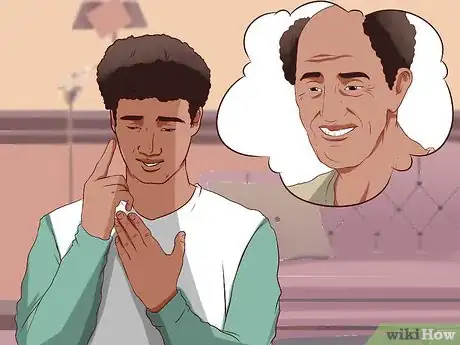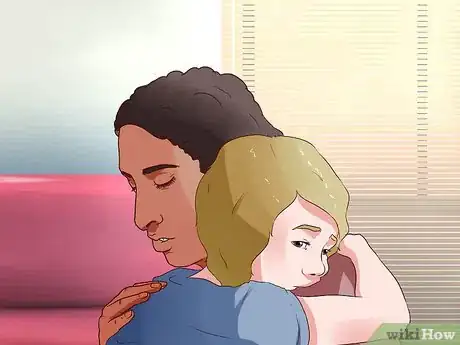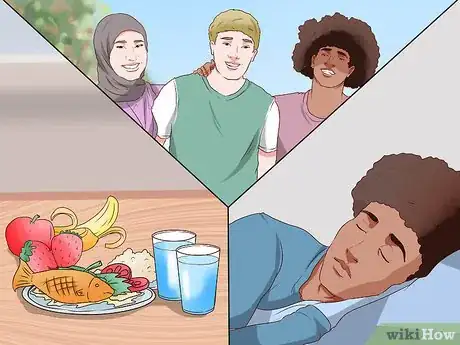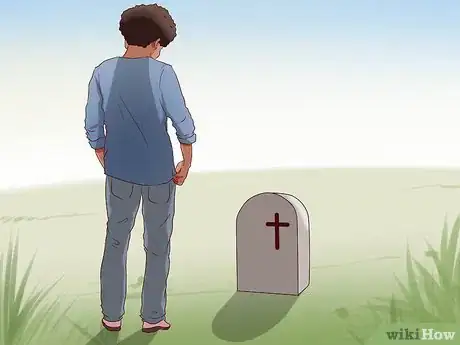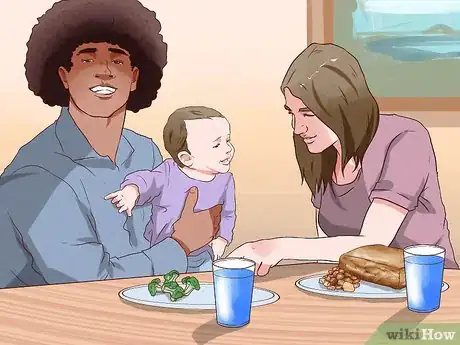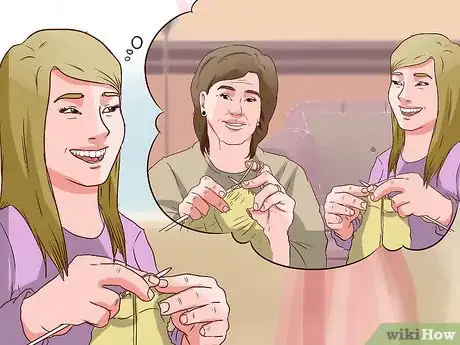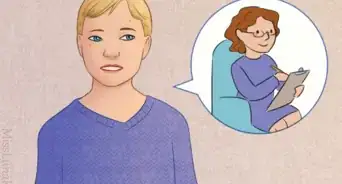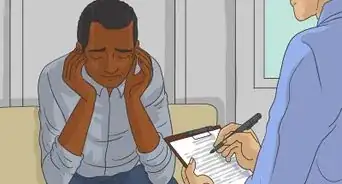This article was co-authored by Ken Breniman, LCSW, C-IAYT. Ken Breniman is a Licensed Clinical Social Worker, Certified Yoga Therapist and Thanatologist based in the San Francisco Bay Area. Ken has over 15 years experience of providing clinical support and community workshops utilizing a dynamic combination of traditional psychotherapy and yoga therapy. He specializes in eclectic non-denominational yoga guidance, grief therapy, complex trauma recovery and mindful mortal skills development. He has a MSW from Washington University in St. Louis and an MA Certification in Thanatology from Marian University of Fond du Lac. He became certified with the International Association of Yoga Therapists after completing his 500 training hours at Yoga Tree in San Francisco and Ananda Seva Mission in Santa Rosa, CA.
wikiHow marks an article as reader-approved once it receives enough positive feedback. This article received 24 testimonials and 89% of readers who voted found it helpful, earning it our reader-approved status.
This article has been viewed 287,994 times.
Dealing with the death of grandparent may be one of the hardest things you ever have to do. It may be doubly hard because it could be your first experience with losing a loved one. Though the ache in your heart won't magically go away, you can take steps to accept your feelings and to learn to cope with losing a person who is near and dear to you by talking about it, using your family for support, and returning to your life. Your memories of your dear grandparent will stay with you long after he or she has passed, and you will always be able to honor the memory of the person you love. If you want to know how to deal with the death of a grandparent, see Step 1 to get started.
Steps
Accepting Your Feelings
-
1Take as much time as you need. Don't listen to the people who tell you that there's a timeline when it comes to grief. Some people take a lot less time than others when it comes to moving on after the passing of a loved one, and you shouldn't feel down on yourself if you feel like you've been in grief for a long time. The important thing is that you take the time to fully process your feelings instead of going through the motions of moving on right away, and repressing how you really feel.[1]
- Know that there's no firm line you cross from grieving to "moving on," and that moving on doesn't mean that you've forgotten your grandparent and are no longer sad about the loss. Every person should take as much time as he or she needs.[2]
- Of course, if many, many months have gone by, or even a year or two, and you feel like you're still so deep in grief that you're finding it hard to function, then getting professional help could be a way to move forward.[3]
-
2Let your emotions out. Another way to accept your feelings is to cry, scream, be angry, or just to do whatever you need to do to get your feelings out. You don't want to hold back your tears or repress your emotions because that will lead you to have a harder time coping down the line. You may be wary of showing your emotions, especially if a grieving parent or your other grandparent needs you for support, but you should let those feelings out some time, whether it's with a friend, an understanding family member, or by yourself.[4]
- Taking time just to cry can be very therapeutic. That said, don't feel guilty or confused if you're not the crying type and you can't find tears even though you're deeply sad.
- This can also be a good time to write in your journal about how you're feeling. It can help you channel your feelings in a more organized and quiet way.
Advertisement -
3Keep your beloved grandparent in your heart and memories. Don't think that there will come a point when you stop thinking about your beloved grandparent entirely. You can always keep him or her in your heart and memory. Allow yourself to think about the good times you shared, the conversations you had, and the trips you took together. And if you had some disagreements or bad times together, you can think about that too. It's not about only treasuring the good times and forgetting the bad, but about honoring the entire person.
- Write down anything you remember about your grandparent. This can help you forever keep him or her in your heart.
- Look at photographs of you with your grandparent to feel at peace.
-
4Be aware of your triggers. Of course, some times of the year or some places will make it harder for you to cope with the loss of a grandparent. Maybe you should avoid the lake where you used to go fishing with your grandfather, or the diner where your grandmother always took you to get ice cream, for a while until you feel ready to face your favorite places. Maybe Thanksgiving or Christmas will be especially hard because you associate those holidays with spending time with your grandparents. Knowing what those triggers are can help you either avoid them, or find extra support if you can't.
- This doesn't mean that you should stop doing all of the things you loved to do with your grandparent forever. It just means you may need a bit of time away from those things until you feel more stable and at peace.
- Unfortunately, some things like holidays may always be a little bit harder. But with time, as well as support from your family, you will be able to enjoy them again while thinking of your grandparent at the same time.
-
5Support and get support from your other family members. One of the best things you can do to accept your feelings is to talk to your other family members about the loss. Your parents may really need your support, and you should be there for them. If you have another living grandparent, you should also be there for him or her through this difficult time. You can both share your own feelings while supporting your loved ones, and you shouldn't feel pressure to be strong all the time. The most important thing is that you should be present.[5]
- Don't be afraid to share your feelings. Spend more time around your family members than usual instead of holing up in your room with your sadness. Even if they may not ask for your company, they'll appreciate it.[6]
-
6Remember to take care of yourself. One important thing to keep in mind as you deal with the loss of your grandparent is that you shouldn't forget to take care of yourself. Make sure you get enough rest — without spending all day in bed — eat three healthy meals a day, and take the time to go outside and to socialize. Taking care of other family members may be important, but you shouldn't completely sacrifice your own well-being in the processes. Showering regularly and maintaining your hygiene can also help you feel more in control of your life. Though you will still feel unsettled, sticking to a healthy routine can make a big difference.
- Even if you feel absolutely horrible, just showering and putting on clean clothes can make you feel better than spending all day in bed without grooming yourself.
- Getting enough rest can help you feel more in control of your emotions. If you're exhausted from not getting enough sleep or feeling wonky from sleeping too much, then it will be harder for you to cope.
Honoring the Memory of Your Beloved Grandparent
-
1Learn more about your grandparent. Once your parents or other family members are ready, don't be shy about asking them about anything you didn't know about your grandparent. Talk to them about where he or she grew up, what his or her job was like, what stories you may not have heard about him or her, or just any other details that spring to mind when your beloved grandparent comes up. Many grandchildren tend to think of their grandparents as kind old people instead of people with a rich history and background, especially if they lose them at a young age; having a sense of the whole person you lost can help you feel like you're more in control of the situation.
- If your parent is ready to talk about it, ask what it was like for him or her to grow up in a house with your grandparent, and what memories he or she can share from childhood.
-
2Write down the stories your grandparent used to tell. Though not all grandparents love to reminisce about their lives, many of them do love to share stories of their childhood, their work, their home city or country, or what the world was like, back in the day. Get together with your loved ones and see how many stories you remember hearing from your beloved grandparent. Writing them all down can help you get a sense of the whole person, and can give you something to treasure forever.
- You can even pass the notebook around, letting everyone write the story he or she remembers. Though it's impossible to get a full sense of the person you lost, you can find comfort in remembering these stories.
-
3Look at photos of your grandparent's life. Though your beloved grandparent may not have had a Facebook account that chronicled his or her life from birth until his or her final years, looking through a family album can help you find peace and to get a better understanding of the person your grandparent was. There may not be a million photographs available, so you should really linger over each and every photo and memory made by your grandparent. Go through the album with a family member, who can help provide some context, and take comfort in the fact that your grandparent lived a full and rich life.
- If the photos aren't organized in a photo album but are sitting in a box, you can even make a project out of it and create a photo album that honors your grandparent's memory chronologically.
- Of course, this activity will lead to some more tears. Make sure you're ready before you do it.
-
4Treasure the keepsakes that your grandparent gave to you. Take a look at the gifts, photos, sweaters, books, jewelry, or other treasured keepsakes that your grandparent gave you. If it's something you can wear, wear it for a while. If not, display it prominently. Don't think that you have to get rid of these items or put them out of sight to "get over" the loss of your grandparent. You can keep them near and dear to your heart and honor the memory of the person you love.
- If there's something special your grandparent gave you, like a pendant, a figurine, or a written letter, you can even carry it on your person for a while and turn to it for comfort. Though it may seem silly and symbolic, it can help you grieve.
-
5Visit your grandparent's grave if you're ready. If you think that visiting the grave of your grandparent will help you grieve and have a quiet conversation with the one you lost, then you should make a trip there when you feel ready, either alone or with family members. If you're really young and haven't been to a grave before, then you should talk to your parents about it and see if you're ready. If you're older and think that this will help you honor the memory of the person you lost, then you should take this step if you can.
- Bringing flowers or whatever is appropriate in your culture can help you pay tribute to the person you lost.
-
6Talk to other people who lost their grandparent. You may also be able to honor the memory of your grandparent by talking to other people who experienced a similar loss. If you feel like your family members may be too emotionally drained to talk about it, you can talk to friends who have experienced a similar pain and who can help you get through this hard time. Though no two grieving processes are exactly the same, having someone to talk to can make you feel less alone.[7]
Moving Forward
-
1Know that you'll never fully "move on." You shouldn't think that there's a negative connotation associated with the term "moving on," or that it means that you will be able to cast thoughts of your beloved grandparent aside and happily move on about your life. It just means that, while you'll always have a special place for your grandparent in your heart, that you won't feel like the pain is completely holding you back from living your life.
- Don't look at moving on as somehow being disloyal to your beloved grandparent. Look at it as a positive development that will help you live a healthy life.
-
2Change your routine. One thing you can do if you feel like you're in a rut is to switch things up a bit. If you do all of the same things you always did when your grandparent was alive, then you may find it a bit harder to move on than if you switched things up a bit. You can spend more time with your friends and family, take up a new hobby, or discover a love for volunteering or reading that you never knew you had.
- Though you should avoid making drastic changes or big life decisions in a time of grief, making small changes here and there can help you feel like you're getting into a new and positive rhythm.
-
3Spend more time with your family members. Another way to feel more comforted and to move forward is to spend more time with your close family members. It's not a cliché that a death in the family can really bring loved ones closer together, and you should take this as an opportunity to spend more time with the ones you care about and to make more family-oriented plans. This can help you in the grieving process and can also bring you comfort and stability.
- Maybe you don't normally come home for the holidays or you're not the type to talk to your parents on the phone multiple times a week. Try to increase the amount of time you spend communicating with your family and you'll see that it brings you strength in this difficult time.
-
4Return to doing the things you and your grandparent used to love to do together. Though it's natural that you may want to avoid some of the activities you used to do with your beloved grandparent, such as hiking in your favorite wooded area, making dessert, or just watching baseball, after a while, returning to these activities should feel natural and should even make you happy. Don't avoid doing the things you used to love forever, or you may never feel like you're progressing with your grief. When you feel ready, venture out to do those things you loved to do on your own or with another family member or friend.
- Though it won't be the same as doing the activity with your grandparent, it's a way to channel the fond memory you have about being with the one you love.
-
5Get more help if you need it. If you feel like you're still grieving and feeling just as bad as you did when you first got the sad news after many months have gone by, then you may need to seek additional help. You can see a grief counsellor, go to group therapy, or even talk to a doctor if you feel like nothing is working. There's no shame in admitting that you need more help getting through this difficult time, and it will only do you good to take as many measures as you can to move forward.[8]
-
6Remember that your grandparent would want you to enjoy the rest of your life. Though this may sound like a corny piece of advice when you're in the throes of grief, at the end of the day, there's nothing more true. Your grandparent loves you dearly and would want you to go on to live a happy and meaningful life while remembering all of the amazing times you shared. You may feel like you're in a rut, or you may feel guilty for experiencing joy, but the best thing you can do is to go on to enjoy your life while thinking fond thoughts of your grandparent.
- Your grandparent's influence on your life will continue long after he or she has passed away. The best thing you can do for yourself and for everyone around you is to continue to enjoy your daily life while keeping your grandparent close to you in your heart and memory.
Expert Q&A
-
QuestionHow long does it take to get over the death of a grandparent?
 Ken Breniman, LCSW, C-IAYTKen Breniman is a Licensed Clinical Social Worker, Certified Yoga Therapist and Thanatologist based in the San Francisco Bay Area. Ken has over 15 years experience of providing clinical support and community workshops utilizing a dynamic combination of traditional psychotherapy and yoga therapy. He specializes in eclectic non-denominational yoga guidance, grief therapy, complex trauma recovery and mindful mortal skills development. He has a MSW from Washington University in St. Louis and an MA Certification in Thanatology from Marian University of Fond du Lac. He became certified with the International Association of Yoga Therapists after completing his 500 training hours at Yoga Tree in San Francisco and Ananda Seva Mission in Santa Rosa, CA.
Ken Breniman, LCSW, C-IAYTKen Breniman is a Licensed Clinical Social Worker, Certified Yoga Therapist and Thanatologist based in the San Francisco Bay Area. Ken has over 15 years experience of providing clinical support and community workshops utilizing a dynamic combination of traditional psychotherapy and yoga therapy. He specializes in eclectic non-denominational yoga guidance, grief therapy, complex trauma recovery and mindful mortal skills development. He has a MSW from Washington University in St. Louis and an MA Certification in Thanatology from Marian University of Fond du Lac. He became certified with the International Association of Yoga Therapists after completing his 500 training hours at Yoga Tree in San Francisco and Ananda Seva Mission in Santa Rosa, CA.
Licensed Clinical Social Worker & Certified Yoga Therapist It totally depends. There are no hard and fast rules when it comes to grief. With that said, if your grief is prolonged and you're just having a lot of trouble getting over it, it may help to reach out for help.
It totally depends. There are no hard and fast rules when it comes to grief. With that said, if your grief is prolonged and you're just having a lot of trouble getting over it, it may help to reach out for help. -
QuestionHow do I get over being scared to lose my grandfather?
 Ken Breniman, LCSW, C-IAYTKen Breniman is a Licensed Clinical Social Worker, Certified Yoga Therapist and Thanatologist based in the San Francisco Bay Area. Ken has over 15 years experience of providing clinical support and community workshops utilizing a dynamic combination of traditional psychotherapy and yoga therapy. He specializes in eclectic non-denominational yoga guidance, grief therapy, complex trauma recovery and mindful mortal skills development. He has a MSW from Washington University in St. Louis and an MA Certification in Thanatology from Marian University of Fond du Lac. He became certified with the International Association of Yoga Therapists after completing his 500 training hours at Yoga Tree in San Francisco and Ananda Seva Mission in Santa Rosa, CA.
Ken Breniman, LCSW, C-IAYTKen Breniman is a Licensed Clinical Social Worker, Certified Yoga Therapist and Thanatologist based in the San Francisco Bay Area. Ken has over 15 years experience of providing clinical support and community workshops utilizing a dynamic combination of traditional psychotherapy and yoga therapy. He specializes in eclectic non-denominational yoga guidance, grief therapy, complex trauma recovery and mindful mortal skills development. He has a MSW from Washington University in St. Louis and an MA Certification in Thanatology from Marian University of Fond du Lac. He became certified with the International Association of Yoga Therapists after completing his 500 training hours at Yoga Tree in San Francisco and Ananda Seva Mission in Santa Rosa, CA.
Licensed Clinical Social Worker & Certified Yoga Therapist It's exceptionally difficult to do this; the fear of losing somebody is a very primal, normal thing. There are certain things you can do is prepare mentally and emotionally. Meditating, talking to others about your fear, or praying are all totally reasonable and appropriate things to do. You could also make an effort to spend more time with your grandfather.
It's exceptionally difficult to do this; the fear of losing somebody is a very primal, normal thing. There are certain things you can do is prepare mentally and emotionally. Meditating, talking to others about your fear, or praying are all totally reasonable and appropriate things to do. You could also make an effort to spend more time with your grandfather.
References
- ↑ http://www.helpguide.org/mental/grief_loss.htm
- ↑ Ken Breniman, LCSW, C-IAYT. Licensed Clinical Social Worker. Expert Interview. 24 April 2020.
- ↑ Ken Breniman, LCSW, C-IAYT. Licensed Clinical Social Worker. Expert Interview. 24 April 2020.
- ↑ http://www.helpguide.org/mental/grief_loss.htm
- ↑ http://www.helpguide.org/mental/grief_loss.htm
- ↑ Ken Breniman, LCSW, C-IAYT. Licensed Clinical Social Worker. Expert Interview. 24 April 2020.
- ↑ Ken Breniman, LCSW, C-IAYT. Licensed Clinical Social Worker. Expert Interview. 24 April 2020.
- ↑ Ken Breniman, LCSW, C-IAYT. Licensed Clinical Social Worker. Expert Interview. 24 April 2020.
- http://www.helpguide.org/mental/grief_loss.htm
About This Article
Dealing with the death of a grandparent can be incredibly hard, but trying to accept your feelings can make it less painful. Let your emotions out rather than bottling them up. Know that it's completely normal to cry, scream, or feel angry, so make sure you don’t hide these emotions away. It can also help to think about the memories you have with your grandparent. You could write down your favorite times with them or look at photos to help you feel at peace. Another way to deal with the death of a grandparent is to honor their memory. You could learn more about your grandparent from your parents or other family members who feel ready to talk. For example, you could find out where they grew up or what their job was like. You can also treasure keepsakes that your grandparent gave you, such as toys, books, or jewelry, to help you remember them. For more information on dealing with the death of a grandparent, like how to cope with moving on, read on.



